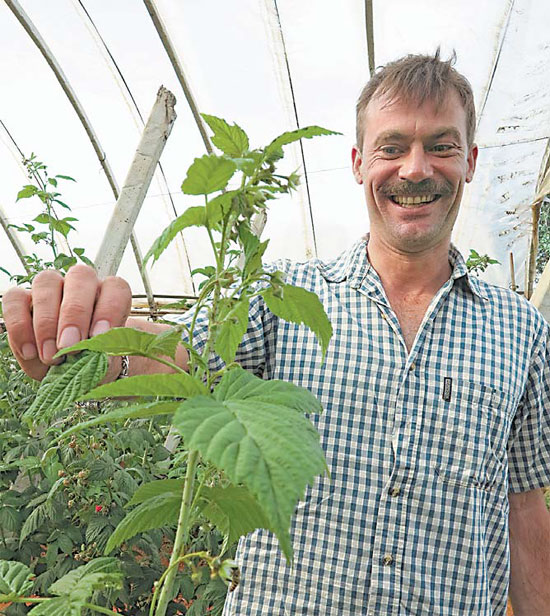Farm not organic but very careful with nature
Although Martin Dabilly says the fruit grown on Meiming Raspberry Farm is safe to eat without washing, he refuses to promote it as organic.
"I don't believe in organic (agriculture)," he says. "It's expensive, useless. I believe in sustainable agriculture. I know fertilizer. Fertilizer is nothing bad."
The French farmer, who grows raspberries in Yunnan province, says he is able to calculate the exact amount of fertilizer needed to ensure the healthy development of each raspberry plant on his farm. However, in China, he says, farmers often apply too much fertilizer and pesticide to the soil.
"They're losing money on fertilizer, and they're killing the soil, because the soil will become very acidic. It's bad for the quality of the fruit," he says. "That's why the pH level of the soil in Dujiangyan (in Sichuan province, where he previously worked on a kiwi farm) was 4, while on my farm it is 6."
Pesticides are not used at Meiming during harvest time, but during growth periods "raspberries attract a lot of pests, and we need to control them", Dabilly says. "I don't want to lie to my customers. Many companies say their products are organic. I know it's not true."
In Dujiangyan, the kiwi fruit was pollinated by hand, but Meiming relies on bees to provide natural pollination. About 20 hives have been installed in the farm's greenhouses.
"If you want to know whether a farm is clean, in terms of pesticides, look to see if there are any bees," the French farmer says. "Bees are exceptionally sensitive to pesticides. Here, if we used a bad product it would kill the bees, and we'd lose our pollinators."
Two years ago, he says, he tested a Chinese brand of pesticide he bought at a local market and spayed it in one of his greenhouses. Within a couple of days, he says he found many dead bees. He eventually discovered the product was counterfeit.
He says the farm tests its soil regularly so fertilizers can be used more efficiently, sometimes even sending samples to laboratories in France.
Being picky about pesticides means it is possible that a customer may find a worm in a box of Meiming raspberries, which Dabilly says happened at a supermarket in Chengdu, capital of Sichuan.
"The customer was angry, the supermarket was angry, and my (wholesale) agent was angry," he says. "I told them that it actually meant our berries were good, and kind of organic."
|
Martin Dabilly says his farm tests its soil regularly so fertilizers can be used more efficiently, and not damage the soil. Photos provided to China Daily |



















